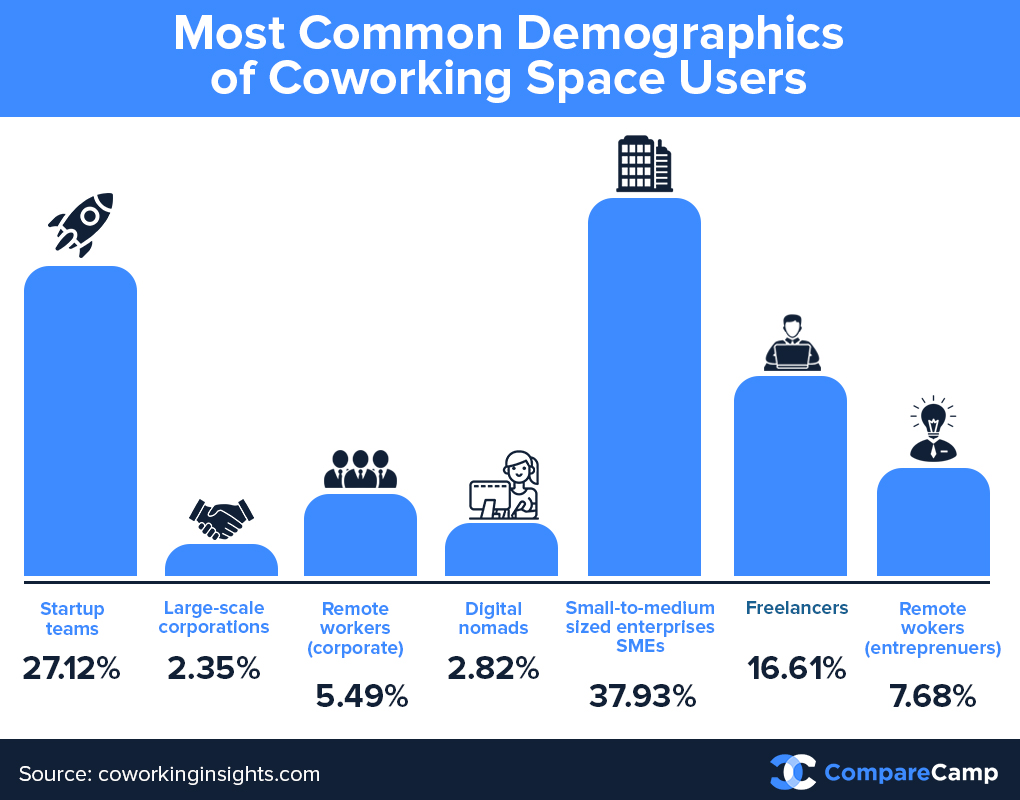Whether you were part of the massive shift to remote work in 2020, or you've been pursuing that work-from-anywhere dream for a while now, you've finally made it in the door. As long as you've got your laptop and a rock-solid Wi-Fi connection, you're golden. But now you're thinking it might be time to level up. Maybe you miss the hustle and bustle of a traditional office. Or maybe staring at the same four walls of your home office space has you feeling uninspired.
Whatever your reasons, it's likely that at some point over the last couple years, you've considered the benefits of joining a coworking space. You're certainly not alone. Coworking spaces have shot up in nearly every city in the U.S. and in many locations abroad, growing 1,000 percent since they first came on the scene.

Coworking spaces are more than a trend, but are they right for you? Here, we'll take a look at the top considerations you need to keep in mind to find out if a coworking space is a good fit for your needs and explore the pros and cons.
But first, who's actually using coworking spaces for remote work? Turns out, a lot of people. In 2017, there were an estimated half a million remote workers using coworking spaces. That number is projected to grow to close to 1.1 million in the next year. Coworkers come from a lot of professional backgrounds and industries, making for a pretty diverse crowd at most facilities.

Pros and Cons of Coworking Spaces
But, wait — isn't the dream to be able to work from home? Wearing your slippers all day, drinking coffee the way you like it, with your only commute being the one from your desk to the fridge? Honestly, after a year and a half at home, that "dream" turned into harsh reality pretty quickly and left a lot of remote workers longing for interaction beyond the Amazon delivery guy. If you're feeling antsy in your home office, or if you're a digital nomad looking for a place to land while traveling the world, keep these considerations in mind when deciding if a coworking space is right for you:
Cost
Pro: It Beats Leasing an Office
In most cities, even a modest private office can cost $500 or more a month. Coworking spaces, on the other hand, generally offer flexible packages that start under $100 and go up depending on your specific needs and wants. Keep in mind, lower price points are nearly always for shared space. While conference rooms are usually available to all, there may be restrictions on when and how frequently you can book them.
Con: It Can Still be Prohibitive
If you really need a private space, you can expect to pay significantly more. You may also find that swanky coworking spaces offer loads of amenities, like fitness centers, yoga studios, craft beer on tap, and more, but they come at a premium. Basic packages will get you Wi-Fi, a tabletop, and communal coffee, but if you want more, you're likely going to have to pay more.
Space
Pro: Dedicated Work Area
If your home office setup is less-than-ideal or you're frequently on the road, having access to space that's exclusively meant for work can be a productivity booster. Libraries and coffee shops are free and are preferred for some remote workers, but there are plenty of distractions and limitations that can kill your workflow and inhibit creative thinking. Knowing that you always have a place you can buckle down and get in the zone with others who are doing the same can help you stay focused and accomplish more.
Con: Limited Customization and Access
With shared workspaces, you get what you get. Aside from coming in early to snag a table by the window, there isn't much you customize about your space. Even if you pay for a private space, it's likely used by other workers at different times, so you won't be able to bring in your own furniture or put artwork on the walls. And while most coworking spaces have top-notch security, you still won't want to leave any of your belongings behind.
Utilization
Pro: Impressive and Modern Design
Today's coworking spaces are cleanly designed and visually appealing. Conference rooms have all the bells and whistles and are a sure way to wow your clients. If you own your own business, it can increase your credibility and put clients at ease, knowing they're in the hands of a professional. It can also be inspiring and motivating to work in a modern and attractive space, especially when you've been scrambling to add new Zoom backgrounds to hide the pile of laundry on your bed for the last 18 months.
Con: Space Is at a Premium
If your membership is for a shared working space, you might find there's competition to get the best spots — the ones with the best view, the right background, the most privacy, or the closest access to the kitchen. Most coworking spaces offer small areas for one-on-one meetings or phone calls, but those can get tied up quickly. If you're concerned about privacy, a shared workspace is likely not the right place for you.
Culture
Pro: Socialization with Like-Minded Professionals
It's what many remote workers miss the most about the golden era of the traditional office: chit-chat around the coffee maker, lunches with coworkers, and the constant and often comforting drone of people at work. You'll get all that in a coworking space. It's been shown that working quietly alongside someone else can increase productivity, so if the idea of keyboards clicking and conversations happening around you is soothing, a coworking space is a great choice.
Con: Distractions Abound
Just like in a regular office, it's sometimes difficult to maintain focus. Most coworking spaces have a set of rules that all workers agree to, but there will always be the loud talkers, the eat-at-their-desk-ers, and the casual YouTube watchers. If you're expecting absolute silence, you might want to try your local library instead.
Flexibility
Pro: Use It When and How You Want
While the first iterations of coworking spaces generally kept to a standard 9-5 open schedule, newer organizations are recognizing that today's remote worker doesn't always have a "day job" — they may have an evening job, a really early morning job, or a work-whenever-they-can job. Most coworking spaces today are expanding their hours, with some even moving to 24/7 access. Plus, flexible membership packages allow you to add upgrades — like private spaces and conference rooms — when you need them.
Con: No Guarantees
As mentioned above, shared workspaces offer no guarantees that you'll get the spot you want. At peak hours, it might be difficult to find parking or even a workspace. And booking conference rooms or private meeting areas can be challenging, especially if you have a basic membership.
All-in-all, coworking spaces offer numerous benefits to remote workers, but they aren't right for everyone. If you miss the traditional office and you're flexible enough to work from a space that isn't "yours," coworking might be a good fit. So, where can you find the best coworking spaces close to home or anywhere you happen to be?
Top Coworking Spaces in the U.S.
Most of the time, these conversations generally start with, "Have you heard of WeWork?" And yes, if you're a remote worker, it's pretty likely you have. WeWork was one of the first to pioneer the coworking world as we know it, so it's not strange that they're always top of mind. But there are many other coworking companies that are growing from the foundation WeWork built. Here are some of the best:
Regus: Fast-growing Regus offers coworking spaces in 475 U.S. cities, and their flexible plans allow you to book for months at a time or pay-as-you-go. Private and even custom office spaces start around $200 per month, and you can switch locations when you like.
Serendipity Labs: Serendipity Labs offers 20 coworking spaces in 14 U.S. states. Flexible membership options are available for individual professionals or remote teams, allowing you to purchase day passes, book corporate events, or sign up for long-term plans.
TechSpace: With stunning modern design and state-of-the-art technology, TechSpace is a growing coworking company with locations in six major U.S. cities. They cater to startups, enterprises, and every business and professional in between.
Industrious: Now located in over 100 U.S. cities, Industrious allows individual users to pay only for the time they need, rather than signing up for long-term contracts. They offer private offices for small teams or suites and custom spaces for larger teams.
Ready to level up your remote lifestyle by joining a coworking space? Or are you thinking it's maybe not the right fit for you? Whatever your remote work style is, our podcast, Remotely Cultured, has all the tips and insider advice to make your work-from-anywhere dream a successful reality.







